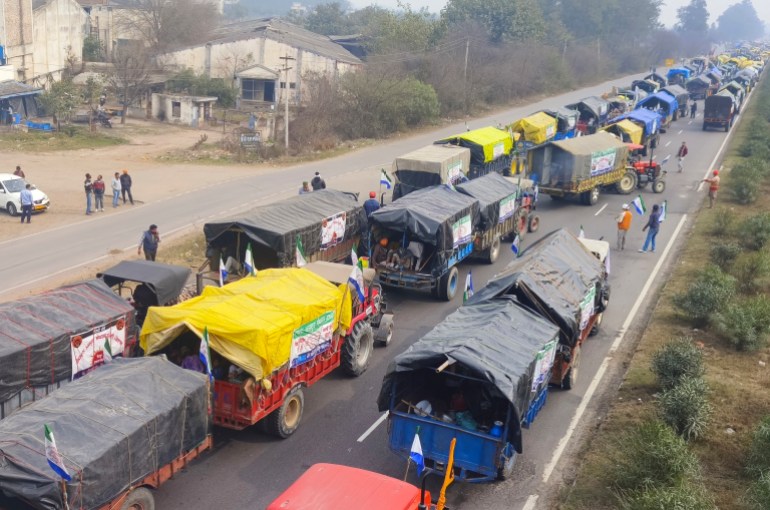India farmers march: What are their demands? Why is gov’t blocking roads?
Farmers are demanding a legal minimum price for their crops as they march to New Delhi and ask government to fulfill its promises.
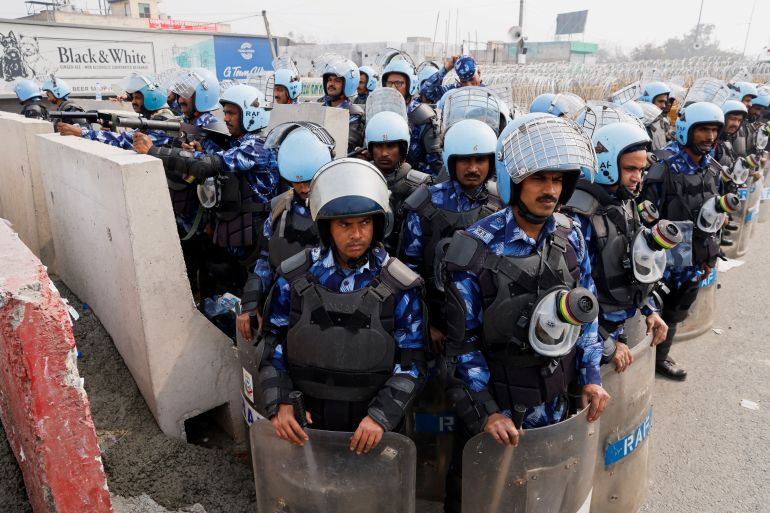
Thousands of farmers on tractors and trucks are marching towards the Indian capital, New Delhi, to push the government to address their demands, including guaranteed prices for their produce and debt waivers.
Police in Haryana state, which borders Delhi, on Tuesday fired tear gas on farmers to prevent them from reaching the capital, which has been converted into a fortress, reviving memories of the 16-month-long agitation by the farmers two years ago. Multiple entry points to the capital have been sealed by erecting barriers of barbed wire, spikes and cement blocks.
Keep reading
list of 4 itemsIndia farmers killed after violence erupts during protest
India farmers: Protesters celebrate as Modi backs down
Mixed feelings as India farmers vacate protest sites near capital
Authorities have banned large gatherings in Delhi and suspended internet services in several Haryana districts ahead of the March to Delhi, called by farmers from Punjab and Haryana along with several other northern states.
Here is more to know about the protest:
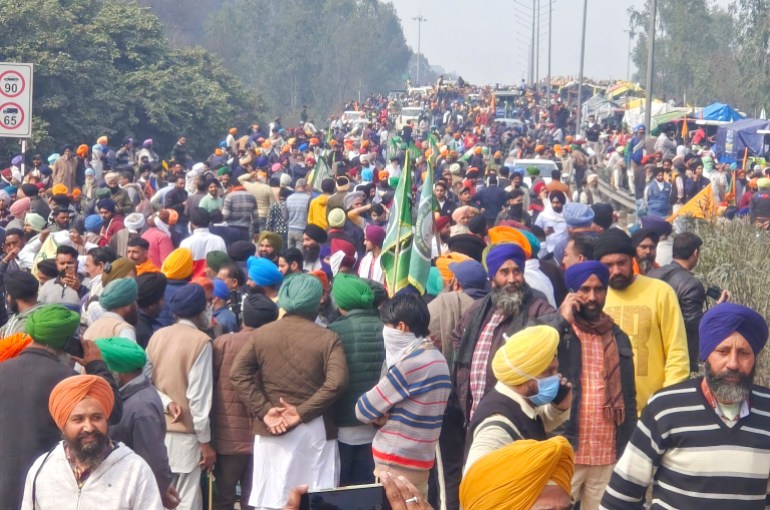
Who is participating?
Aside from organisations from Punjab and Haryana, unions from the states of Uttar Pradesh, Rajasthan and Madhya Pradesh are also participating in the march as they demand government intervention to help the ailing agriculture sector, which is central to the country’s food security.
The Samyukta Kisan Morcha (SKM), Kisan Mazdoor Morcha (KMM) and Kisan Mazdoor Sangharsh Committee are spearheading the protests. The organisers said more than 200 farm unions are participating in the March to Delhi.
The SKM played a key role in the 2020-2021 protests that forced Prime Minister Narendra Modi to repeal three farm laws that farmers feared would have benefitted corporations at their expense. Farmers have accused Modi’s government of failing to fulfill its promises to farmers since then, including doubling their incomes.
The SKM has called for a nationwide rural and industrial strike to express disapproval of the government.
What are the farmers’ demands?
The farmers are demanding legal guarantees of a minimum support price (MSP), which acts as a safety net for the farming community; waivers of farm loans; and a rollback of policies they say hurt farmers.
The MSP, which is the cost at which the government purchases crops from farmers, provides farmers with an assured income for their produce amid market uncertainties.
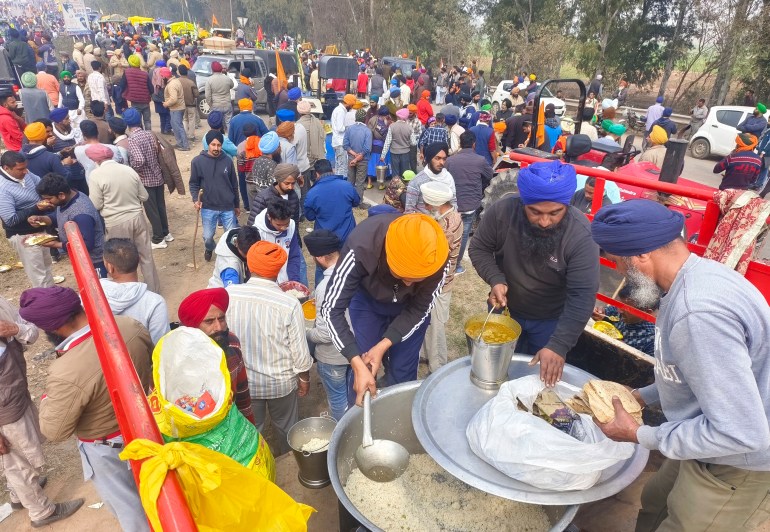
The demand is for the MSP to be fixed at least 50 percent higher than the cost of production of any crop.
Farmers are agitating against the planned privatisation of the electricity sector. State governments currently provide subsidised electricity to farmers, which helps bring input costs down.
They are also demanding compensation for the farmers who died during the 2020-2021 protests.
“There have been around 750 martyrs during the struggle,” said Vijoo Krishnan, the general secretary of the All India Kisan Sabha, an organisation participating in the current protests.
Often farmers have to go to jail for not paying pay back an outstanding loan but nearly Rs 15-lakh worth of bad loans of corporates have been quietly written-off in past 10 years. I have never seen them sitting at Jantar Mantar. https://t.co/hCL3AEE2Ks
— Devinder Sharma (@Devinder_Sharma) February 13, 2024
Another demand is the dismissal of a federal minister whose son was accused of running his car over farmers in Uttar Pradesh’s Lakhimpur Kheri district in October 2021.
The protests also seek to ensure that the promises made by Modi’s Bharatiya Janata Party (BJP) in 2021 are acted on.
“The three acts have been withdrawn, but BJP-ruled states are trying to bring them through the backdoor. Even the recent budget has sought to privatise post-harvest activities,” Krishnan said.
Modi’s government formed a committee to address farming issues, but it failed to include representatives from Punjab, Haryana and Uttar Pradesh, all major grain producers. The committee has hardly made any progress.
In the meantime, farmers continue to struggle with longtime problems. Debt due to crop failures causes thousands of Indian farmers to take their lives every year. Agriculture output has been reduced by extreme weather and dwindling water sources caused by climate change.
How has the BJP government responded?
A government delegation has held negotiations with the protesting farmers, but the talks have not yielded results. On Tuesday, Indian police tear-gassed and detained some farmers who clashed with them at the border between Haryana and Punjab. Police also dropped canisters of tear gas from a drone at one of the border points in northern Haryana state that leads to Delhi.
Devinder Sharma, an Indian agricultural expert, pointed out that farmers have been cut off from the capital as Delhi’s and Haryana’s borders have been fortified by authorities.
“How can we keep them away from the country? From the capital? From the decision-making?” he asked.
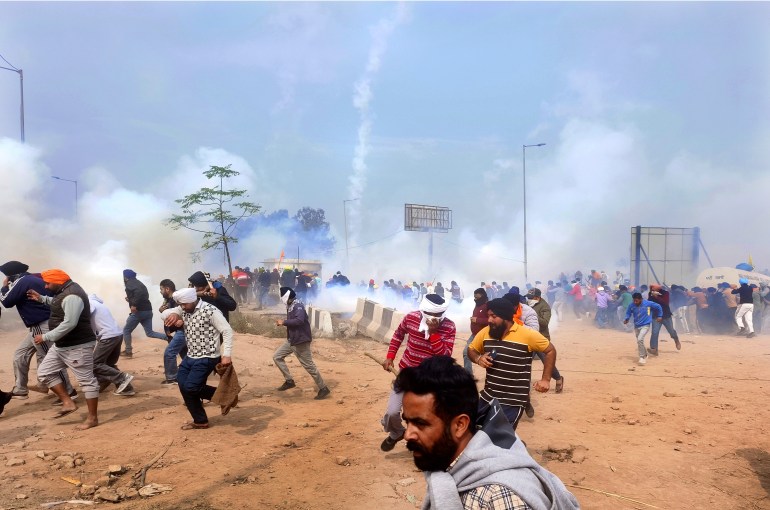
What were the 2020-2021 protests about?
During the earlier protests, farmers protested against laws passed by the BJP government that allowed farmers to sell produce directly to bulk buyers and make contract farming easier.
While Modi said the laws were aimed at liberating the farmers, they prompted the resignation of Harsimrat Kaur Badal, the food processing minister, who called the legislation “anti-farmer”. Modi was forced to withdraw the three farm laws in 2021.
In 2022, Modi’s administration promised it would set up a panel of farmers and state officials to find ways to ensure support prices for all farm produce. Farmers have accused the BJP government of lagging behind on that promise.
What impact will the protests have on the Indian elections?
The march comes months before a general election, which the BJP is expected to win.
“We don’t know how this protest proceeds and if it results in workable solutions,” Sharma said, adding, “If it lingers on, then only will it have an impact on the election.”
Farmers comprise two-thirds of India’s 1.4 billion people, accounting for nearly a fifth of the country’s gross domestic product, according to government figures. Hence, farmers form an influential voting bloc, and parties try to gain their support.
Krishnan said the BJP is being condemned for its “anti-farmer and anti-worker policies”.
As it seeks the farmers’ votes, the Modi government last week conferred the nation’s highest civilian honour on former Prime Minister and agriculture leader Chaudhury Charan Singh and MS Swaminathan, a pioneer of the agricultural revolution in the 1960s and ’70s.
